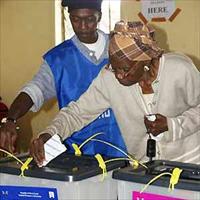ANGOLA: How free will the elections be?

The prospect of Angola holding free and fair parliamentary elections in September is diminishing, according to a recent report by Human Rights Watch (HRW), a watchdog organisation.
Georgette Gagnon, HRW's Africa director, said in a statement that with "less than a month before elections, it's clear Angolans aren't able to campaign free from intimidation or pressure and unless things change now, Angolans won't be able to cast their votes freely."
The poll for the National Assembly is scheduled for 5 September and will be first elections since the combined presidential and parliamentary poll during a brief cessation in the civil war, in 1992, after which the conflict reignited over electoral disagreements.
Peace was achieved in 2002 in the wake of the killing of Jonas Savimbi, leader of the anti-government National Union for the Total Independence of Angola (UNITA).
Presidential elections are scheduled for 2009 and will coincide with the anniversary marking 30 years of rule by President Jose Eduardo dos Santos in one of Africa's main oil-exporting countries. No date for the presidential poll has been set.
Dos Santos said earlier this month “In this competition (elections) there are no enemies, there are political opponents only, with different political programes that will seek to attract the highest number of votes to conquer the power and exert it with legitimacy.”
However, Gagnon said "Angolans need to see improvements now if September's poll is to have a chance of meeting the basic requirements of a free election."
In a statement HRW said Angola's MPLA government was failing to adhere to electoral guidelines established by the regional body, the Southern African Development Community (SADC), of which Angola is a member.
Angola's poll will be the third major election in the SADC region this year, and while Botswana's elections passed off without a hitch, the SADC remains embroiled in the fallout from Zimbabwe's elections, which were declared as falling short of the body's electoral standards.
HRW conducted research in the Angolan capital, Luanda, the Cabinda enclave, and the central provinces of Huambo, Bie and Benguela, between March and June 2008, and found the government was "failing to fully ensure the right to free elections, and other rights critical to a fair poll, including the freedoms of expression and assembly".
The rights body said incidents of political violence were occurring, mainly in the country's rural areas, which had been fiercely contested during the three decades of civil war between the MPLA and UNITA.
"Patterns of violence include sporadic assaults by local MPLA supporters, sometimes involving traditional authorities and local MPLA leaders, against local UNITA party members and their property and party symbols," the HRW said. Traditional leaders in the provinces were also increasingly being targeted by the MPLA in a bid to thwart UNITA's political activities.
Citing an example of this trend, the HRW said: "On May 30 (2008), a group of 30 MPLA supporters beat the traditional leader, Pedro Pomba, in the village of Bongue Kandala [Kapupa commune, Cubal Municipality, Benguela] together with five UNITA members, on the grounds that he allowed a UNITA flag to fly in the village two days before."
Cabinda
Despite a 2006 peace agreement signed with a faction of the separatist group, the Liberation Front of the Enclave of Cabinda (FLEC), HRW said "a low-intensity, but still violent, separatist conflict and heightened military presence continues in the province."
The rights group said government intimidation, military detention, and restrictions on freedom of expression and assembly "significantly undermined" any chance of free and fair elections in the restive province that is the source of most of Angola's oil.
Earlier this year a manifesto was signed by thousands of Cabindan residents calling for dialogue to solve Cabinda's claim to self-determination, and promote debate on issues concerning autonomy.
"No such discussions have occurred and there is little space for expressing such opinions," HRW noted after finding that such expressions attracted the ire of the authorities.
"In August 2007, Mateus Massinga, the provincial secretary of the opposition Frente para a Democracia (Front for Democracy), was sentenced to five months in prison, suspended for two years, for 'insubordination and incitement of violence' after attempting to distribute a news release supporting autonomy," HRW said.
Electoral oversight
The rights body said the National Electoral Commission (CNE), the 11-member oversight body for elections, chaired by the deputy president of the Supreme Court, was not independent and the "majority of the CNE members are effectively appointed by the ruling party."
Attempts by civil society to access the voters' register, compiled by a government agency between November 2006 and May 2008, to conduct an independent audit have been denied. "The central voter register seems to be property of the CIPE (Inter-Ministerial Commission for the Electoral Process) and the government," HRW commented.
A presenter at the state television broadcaster was suspended after admitting publicly to MPLA interference in its editorial policy, and legal proceedings against the independent media have accelerated.
"In June 2008, a court sentenced the director of the independent weekly newspaper, Semanario Angolense (Angola Weekly), Felisberto Graça Campos, to a six-month prison sentence and ordered him to pay US$90,000 in damages following his conviction in three separate libel cases filed by government officials, which had been pending for years," HRW said.
A recent government press statement said all political "parties and coalitions will have an air time for radio and TV broadcasting, to expose their messages and present their government programmes and their electoral manifestoes."
 Back and Next - Back and Next
Back and Next - Back and Next See Also - See Also
See Also - See Also